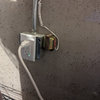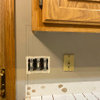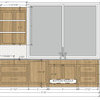Live wire sticking up out of yard
trancefusion
13 years ago
Related Stories

REMODELING GUIDESAdding On: 10 Ways to Expand Your House Out and Up
A new addition can connect you to the yard, raise the roof, bring in light or make a statement. Which style is for you?
Full Story
MOST POPULAR25 Ideas to Perk Up Your Side Yard
Turn this often overlooked area into an enticing and useful outdoor space
Full Story
HOUZZ TOURSHouzz Tour: Up and Out Around a Heritage Tree
A Texas ranch house gets a modern makeover and a two-story addition that wraps around a protected backyard elm
Full Story
DECKSA Family-Friendly California Yard Wises Up About Water
Pavers and unthirsty plants replace Kentucky bluegrass in a Menlo Park landscape for a family of 4
Full Story
YELLOWYour Colors: Stick Around, Sunshine
Warm up the season with yellow walls, fabrics and sunny accents
Full Story
PETS15 Outdoor Pet Projects You'll Lap Up
These bubbling fountains, shelters and other creations by Houzzers are treats for pets and inspiration for other owners
Full Story
DIY PROJECTSHide All Those Wires in a DIY Charging Station
Keep your gadgets handy and charged with a flexible storage board you can design yourself
Full Story
LIGHTING10 Ways With Wall Lights That Don’t Need to Be Wired In
Learn how to add illumination to your home without carving into the walls
Full Story
HOUZZ TOURSMy Houzz: Pretty Meets Practical in a 1920s Walk-Up
Creative styling gives an 800-square-foot rental such an inspired homey air, you might just miss the office in the living room
Full Story
REMODELING GUIDESHow to Stick to Your Remodeling Goals
Avoid getting lost in the sea of remodeling decisions by using these 5 steps as an anchor
Full StoryMore Discussions









DavidR
Ron Natalie
Related Professionals
Salem General Contractors · Abington General Contractors · Gallatin General Contractors · Hartford General Contractors · North Lauderdale General Contractors · River Edge General Contractors · Rolling Hills Estates General Contractors · Syosset General Contractors · Tabernacle General Contractors · Waldorf General Contractors · Carson Solar Energy Systems · Franklin Solar Energy Systems · Franklin Home Automation & Home Media · Leander Home Automation & Home Media · Medford Home Automation & Home MediatrancefusionOriginal Author
jaansu
marknmt
brickeyee
marknmt
rvsunn
Ron Natalie
ionized_gw